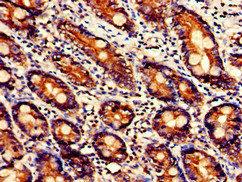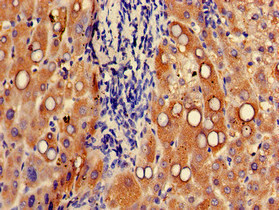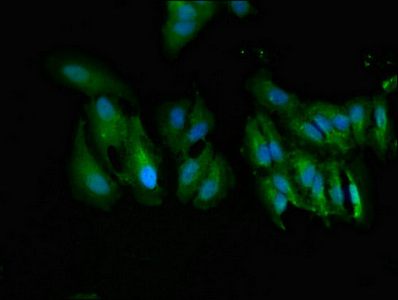UGT1A9 Antibody
-
货号:CSB-PA025582LA01HU
-
规格:¥440
-
促销:
-
图片:
-
Immunohistochemistry of paraffin-embedded human small intestine tissue using CSB-PA025582LA01HU at dilution of 1:100
-
Immunohistochemistry of paraffin-embedded human liver tissue using CSB-PA025582LA01HU at dilution of 1:100
-
Immunofluorescent analysis of Hela cells using CSB-PA025582LA01HU at dilution of 1:100 and Alexa Fluor 488-congugated AffiniPure Goat Anti-Rabbit IgG(H+L)
-
-
其他:
产品详情
-
产品名称:Rabbit anti-Homo sapiens (Human) UGT1A9 Polyclonal antibody
-
Uniprot No.:O60656
-
基因名:UGT1A9
-
别名:UGT1A9; GNT1; UGT1; UDP-glucuronosyltransferase 1A9; UGT1A9; UDP-glucuronosyltransferase 1-9; UDPGT 1-9; UGT1*9; UGT1-09; UGT1.9; UDP-glucuronosyltransferase 1-I; UGT-1I; UGT1I; lugP4
-
宿主:Rabbit
-
反应种属:Human
-
免疫原:Recombinant Human UDP-glucuronosyltransferase 1-9 protein (277-473AA)
-
免疫原种属:Homo sapiens (Human)
-
标记方式:Non-conjugated
本页面中的产品,UGT1A9 Antibody (CSB-PA025582LA01HU),的标记方式是Non-conjugated。对于UGT1A9 Antibody,我们还提供其他标记。见下表:
-
克隆类型:Polyclonal
-
抗体亚型:IgG
-
纯化方式:>95%, Protein G purified
-
浓度:It differs from different batches. Please contact us to confirm it.
-
保存缓冲液:Preservative: 0.03% Proclin 300
Constituents: 50% Glycerol, 0.01M PBS, pH 7.4 -
产品提供形式:Liquid
-
应用范围:ELISA, IHC, IF
-
推荐稀释比:
Application Recommended Dilution IHC 1:20-1:200 IF 1:50-1:200 -
Protocols:
-
储存条件:Upon receipt, store at -20°C or -80°C. Avoid repeated freeze.
-
货期:Basically, we can dispatch the products out in 1-3 working days after receiving your orders. Delivery time maybe differs from different purchasing way or location, please kindly consult your local distributors for specific delivery time.
相关产品
靶点详情
-
功能:UDP-glucuronosyltransferase (UGT) that catalyzes phase II biotransformation reactions in which lipophilic substrates are conjugated with glucuronic acid to increase the metabolite's water solubility, thereby facilitating excretion into either the urine or bile. Essential for the elimination and detoxification of drugs, xenobiotics and endogenous compounds. Catalyzes the glucuronidation of endogenous estrogen hormones such as estradiol and estrone. Also catalyzes the glucuronidation of the isoflavones genistein, daidzein, glycitein, formononetin, biochanin A and prunetin, which are phytoestrogens with anticancer and cardiovascular properties. Involved in the glucuronidation of the AGTR1 angiotensin receptor antagonist caderastan, a drug which can inhibit the effect of angiotensin II. Involved in the biotransformation of 7-ethyl-10-hydroxycamptothecin (SN-38), the pharmacologically active metabolite of the anticancer drug irinotecan. Also metabolizes mycophenolate, an immunosuppressive agent.; Lacks UGT glucuronidation activity but acts as a negative regulator of isoform 1.
-
基因功能参考文献:
- Icaritin was subjected to significant glucuronidation, wherein UGT1A3, 1A7, 1A8, 1A9 and 2B7 were main contributing enzymes. PMID: 28443723
- Inter-isoform Hetero-dimerization of Human UDP-Glucuronosyltransferases (UGTs) 1A1, 1A9, and 2B7 and Impacts on Glucuronidation Activity PMID: 27857056
- The findings of the study highlighted correlation between UGT1A9 -440C/T gene polymorphisms and positive propofol efficacy in patients undergoing painless induced pregnancy termination procedures. PMID: 28899924
- A significantly higher number of UGT1A9 polymorphisms was found in the group that did not respond to Mycophenolic acid treatment. PMID: 27549213
- None of the patients with Regorafenib-induced severe toxic hepatitis had CYP3A4 gene mutations. Similar polymorphisms in UGT1A9 gene promoter region were found in both patients who presented acute hepatitis. PMID: 27500989
- No association between the UGT1A9 c.98T>C polymorphism and mycophenolic acid plasma levels were found in renal transplant patients. PMID: 28613375
- UGT1A1, UGT1A6, and UGT1A9 were the chief contributors to the regioselective glucuronidation of diosmetin and chrysoeriol in the liver. PMID: 27832172
- polymorphisms c.98T>C in the UGT1A9 and c.1075A>C in the CYP2C9 genes did not affect the pharmacokinetic profile of propofol PMID: 27826892
- Carriers of T-275A and C-2152T single-nucleotide polymorphisms of the UGT1A9 gene promoter region show a greater incidence of death from digestive system cancer after kidney transplantation. PMID: 27932114
- demonstrated the effects of UGT1A9 genetic polymorphisms on MHD plasma concentrations and OXC therapeutic efficacy. Through MHD monitoring, we can predict OXC therapeutic efficacy, which may be useful for the personalization of OXC therapy in epileptic patients PMID: 27900402
- Dimerization changed the chemical regioselectivity, substrate-binding affinity, and enzymatic activity of UGT1A1 and UGT1A9 in glucuronidation of quercetin. PMID: 27025983
- UGT1A9 contributes to the in-vitro glucuronidation of arctigenin in liver microsomes. PMID: 26407805
- Suggest that the enzymatic properties of UGT1A9 are considerably different between humans and cynomolgus monkeys, although humUGT1A9 and monUGT1A9 were highly conserved at the amino acid level. PMID: 24470170
- We observed statistically significant associations between SNP and Drug-induced liver injury at both allele and genotype levels of of UGT1A9 promoter PMID: 25446781
- in tumor liver microsomes from HCC patients, either V(max) (maximum reaction rate, R(max) for UGT1A1) or clearance rates (V(max)/K(m), Clint) of UGT1A, UGT1A1, UGT1A4, UGT1A9 and UGT2B7 were lower than those in the adjacent normal liver microsomes PMID: 26010150
- Significantly lower estimated glomerular filtration rate of the renal allograft in UGT1A9 c.98C carriers did not translate into decreased allograft survival. PMID: 25380893
- Data shows that UGT1A9*22 allele was significantly less frequent in the Uzbek population compared to the Japanese. PMID: 24453052
- UGT1A9 is the major isoform responsible for the glucuronidations of fraxetin in liver microsomes. PMID: 24025985
- In HeLa cells overexpressing UGT1A9 there was an increase in catalysis and production of luteolin glucuronides. PMID: 24092055
- the UGT1A9 proximal promoter was assumed to change into the non-active form from the original sequence, and this might be one of the reasons for the tissue-specific expression of UGT1A9. PMID: 23842475
- UGT1A9 is a major contributor for (R) and (S) glucuronidation in the human liver and kidney. PMID: 23527766
- Alleles UGT1A9*4 and UGT1A9*5 were not present in any of the subjects of Polish population. PMID: 23184343
- determined the kinetics of efflux of 13 flavonoid glucuronides using the newly developed HeLa-UGT1A9 cells and correlated them with kinetic parameters derived using expressed UGT1A9 PMID: 23402418
- Data suggest that the substrate specificity of UGT1A9 includes the antiviral drug arbidol; UGT1A9 appears to be the major UGT isoform involved in the formation of arbidol glucuronides by liver microsomes. PMID: 23488780
- UGT1A9 and 2B7 are the main enzymes involved in ethanol glucuronidation. In addition, our results suggest that cannabinol and cannabidiol could significantly alter ethanol glucuronidation. PMID: 23230132
- none of the SNPs in UGT1A9 were present in our study population PMID: 23700788
- genetic association studies in pediatric population in United States: Data suggest that combined SNPs in UGT1A9, UGT2B7, and MRP2 are important in pharmacokinetics/biotransformation of prodrug mycophenolate mofetil in kidney transplant recipients. PMID: 23131697
- In Parkinson's disease patients UDP-glucuronosyltransferase 1A9 genotypes are associated with adverse reactions to to catechol-O-methyltransferase inhibitors PMID: 22527346
- increased cumulated drug exposure and UGT1A9 polymorphism (rs17868320) identified patients at high risk for early sorafenib-induced severe toxicity PMID: 22912756
- Expression of UGT1A9 correlated with age only in children younger than 1 year (Spearman r = 0.70). PMID: 22492655
- Study indicates that genotype status of UGT1A1, UGT1A9, and ABCC2 and serum bilirubin concentration increases reflect abnormally high AUC in patients treated with sorafenib. PMID: 22307138
- Report molecular models that can predict phenol substrate selectivity and in vitro clearance of UGT1A9. PMID: 22302521
- Investigation of morinidazole glucuronidation using human liver microsomes (HLMs) and 12 recombinant UDP glucuronosyltransferases (UGTs) indicated that this biotransformation was mainly catalyzed by UGT1A9. PMID: 22184458
- Data suggest that darexaban glucuronidation in liver microsomes is mainly catalyzed by UGT1A9; studies include kinetics of recombinant UGT proteins, liver microsomes, and jejunal microsomes (and UGT isoform-specific inhibitors/substrates). PMID: 22031623
- transplanted kidney function may be affected in patients carrying UGT1A9 98C allele and receiving mycophenolate mophetil PMID: 22210424
- The presence of BSA during the glucuronidation reaction leads to a large increase in the V(max) value of UGT1A9, in addition to lowering its K(m) value. PMID: 21856742
- A significantly stereoselective difference on the glucuronidation of rac-FPF was seen between the two variants compared with the wild type of UGT1A9. PMID: 21856293
- In a study of Japanese renal transplant recipients, there are no significant differences in the area under the plasma concentration-time curve ratio of mycophenolic acid glucuronide/MPA between UGT1A9 I399C/T genotypes. PMID: 18695635
- analysis of stereoselective metabolism of propranolol glucuronidation by human UDP-glucuronosyltransferases 2B7 and 1A9 PMID: 19644937
- Further mutagenesis and activity assays suggested that Phe117 of UGT1A9 participates in 1-naphthol binding PMID: 20089735
- Data point to UGT1A9 as main UGT isoform in liver microsomes metabolizing psilocin (a hallucinogenic indole alkaloid); kinetic studies are included. PMID: 20007669
- N-glycosylation has an important role in the folding of UGT1A9. PMID: 19951703
- In this study, we sequenced the promoter and exon 1 regions of the UGT1A9 gene in 93 Thai individuals and identified 7 genetic polymorphisms PMID: 19881262
- Carriers of single nucleotide polymorphisms in this protein's promotor region show a greater incidence of gastrointestinal side effects and lower exposure to mycophenolic acid. PMID: 19715905
- sequence of the cDNA segment cloned, 1666 bp in length. The recombinant constructed, pREP9-UGT1A9, contains the entire coding region, along with 18 bp of the 5' and 55 bp of the 3' untranslated region of theUGT1A9 cDNA. PMID: 11854913
- 1A9 enzyme is a peroxisome proliferator-activated receptor alpha and gamma target gene PMID: 12582161
- a significant role for UGT1A9 and 2B7 in the catalysis of almokalant glucuronidation PMID: 14660172
- mutant allele with one base insertion in the promoter region of the UGT1A9 gene would alter the level of enzyme expression and the metabolism of those drugs that are substrates of UGT1A9 PMID: 15115919
- Study provides preliminary evidence that genetic factors, especially in hepatic UGT1A9, may contribute to the variability of mycophenolic acid pharmacokinetics observed in transplant patients. PMID: 15258099
- stereoselectivity for etodolac PMID: 15370961
显示更多
收起更多
-
亚细胞定位:Endoplasmic reticulum membrane; Single-pass membrane protein.
-
蛋白家族:UDP-glycosyltransferase family
-
组织特异性:[Isoform 1]: Expressed in liver, kidney, colon, esophagus and small intestine.; [Isoform 2]: Expressed in liver, kidney, colon, esophagus and small intestine.
-
数据库链接:
HGNC: 12541
OMIM: 191740
KEGG: hsa:54600
STRING: 9606.ENSP00000346768
UniGene: Hs.554822
Most popular with customers
-
-
YWHAB Recombinant Monoclonal Antibody
Applications: ELISA, WB, IF, FC
Species Reactivity: Human, Mouse, Rat
-
Phospho-YAP1 (S127) Recombinant Monoclonal Antibody
Applications: ELISA, WB, IHC
Species Reactivity: Human
-
-
-
-
-
























